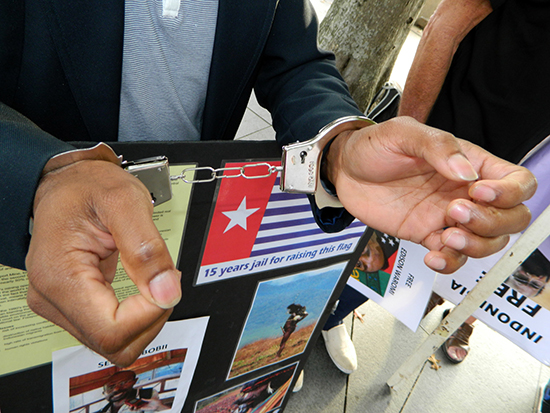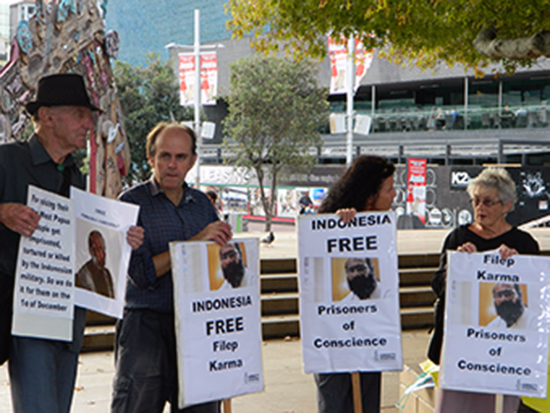
Protesters have taken to the streets and the gates of Indonesian embassies in West Papua, Australia and New Zealand as part of a global day of action to free West Papuan prisoners.
At least five protests took place today on the global day. Indigenous Papuans and Malukans continue to be arrested for peaceful activities such as raising the Papuan Morning Star flag or attending demonstrations and public events that express dissent.
A group of protesters supporting the call for the release of political prisoners staged a mock “imprisonment” vigil in Auckland’s Aotea Square last night with some West Papuans wearing handcuffs.
Radio Australia reported that there was “growing community awareness about the human rights abuses by the Indonesian military in West Papua” while Radio New Zealand International said a protest had taken place in Wellington.
According to RNZI, Green Party MP Catherine Delahunty, said the New Zealand government must do more to free the prisoners.
“The very least New Zealand could do is call on Indonesia to set these prisoners free, they are not criminals, they are political prisoners who should be set free, and New Zealand should stop funding the training programme for the police in West Papua instead of which, where they should be calling on Indonesia to stop the human rights abuses,” Delahunty told RNZI.
West Papua Independence Media reported that a protest had happened in Port Numbay/Jayapura, the capital city of West Papua, while in Melbourne, a demonstration was planned for Tuesday evening, to call for the release of the 77 Papuan and Malukan political prisoners held in Indonesian prisons.
Facing threats
Ian Okoka, a Melbourne-based Papuan independence activist said: “Papuans are losing their right to freely express themselves and many have fled to the jungle for fear of being put in jail.
“Papuans who are seeking independence for Papua through peaceful means are facing threats of arrest and violent intimidation by security forces. Often those arrested, are charged with treason or incitement which can carry lengthy prison sentences.”
The West Papuan democratically elected Prime Minister, Edison Waromi, is also in prison. Shortly after the 2011 Third Papuan Congress, Indonesian soldiers stormed the congregation and arrested Waromi along with President Forkorus Yaboisembut.
In March 2012, Waromi, along with four others, known as the “Jayapura 5”, were put on trial for treason and are currently serving a three-year sentence.
Waromi released a message from prison calling on the United Nations to “prioritise West Papua on its agenda and mediate the political status of West Papua between Indonesia and West Papua” and for Amnesty International, Human Rights Watch (HRW) and TAPOL to conduct investigations into human rights violations in West Papua.
Waromi also called for “real action to end the republic of Indonesia’s colonial occupation of West Papua”.
Arrests doubled
Maire Leadbeater of West Papua Action Auckland said the number of political arrests in Indonesian-controlled West Papua had more than doubled in 2013 compared with the previous year, and reports of torture and ill-treatment of political detainees had also increased.
Joe Collins of the Australia West Papua Association of Sydney said the Indonesian government must release all West Papuan political prisoners unconditionally as a sign of good faith to the West Papuan people.
“A number of articles in the Indonesian Criminal Code such as article 106 is used to stigmatize West Papuans as separatists when in fact all they are doing is using their democratic right to freedom of expression. We call on the Indonesian government to amend or repeal those articles of the Indonesian Criminal Code that have been used to imprison West Papuans for their legitimate peaceful activities” Collins said.
The solidarity groups reported that other demonstrations would be held in London, The Hague, Edinburgh and West Papua.
Source: Pacific Media Watch 8538

This work is licensed under a Creative Commons Attribution-NonCommercial 3.0 New Zealand Licence.




